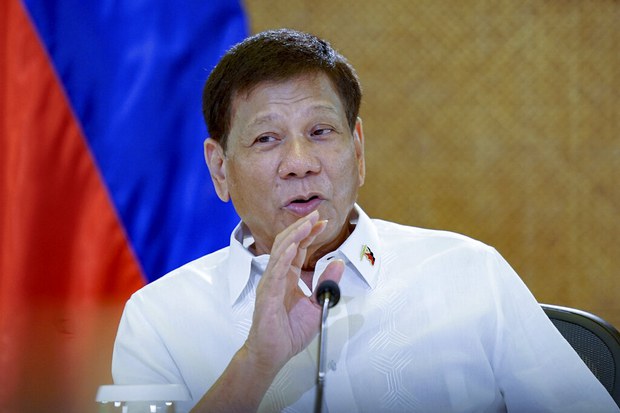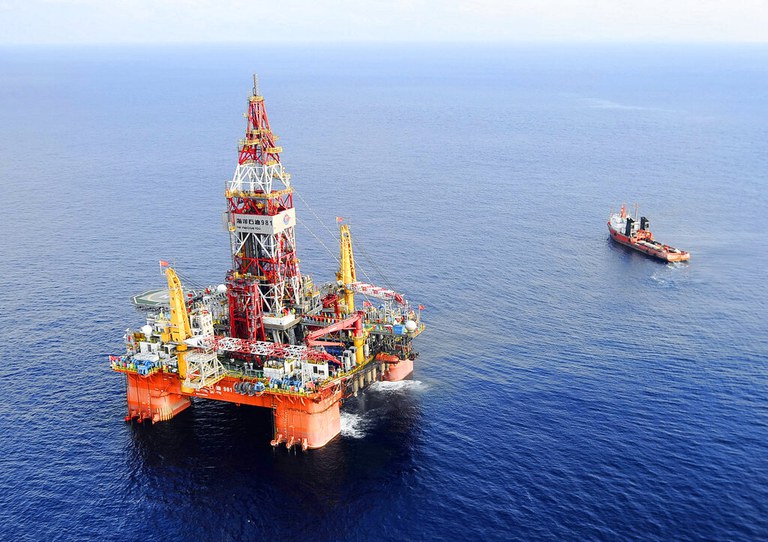Analyst suspects China pressure as Philippines suspends oil exploration
2022.04.21
 Philippine President Rodrigo Duterte gestures while meeting with cabinet officials at the Malacañang presidential palace in Manila, March 7, 2022.
Philippine President Rodrigo Duterte gestures while meeting with cabinet officials at the Malacañang presidential palace in Manila, March 7, 2022.
The Philippines has suspended oil and gas exploration activities in the disputed South China Sea, a presidential spokesman said, under what an analyst described as “coercion” from China.
Martin Andanar, spokesman for President Rodrigo Duterte, told reporters on Tuesday in Manila that the Security, Justice and Peace Coordinating Cluster (SJPCC), or the government’s security advisers, decided to suspend all exploration activities within the disputed areas in West Philippine Sea. It is the name Filipinos use to refer to South China Sea territories claimed by Manila.
Local companies have been test drilling two sites at Reed Bank, known as Recto Bank in the Philippines, off Palawan province for survey purposes, but the government has ordered them to stop.
Andanar said the Department of Energy has requested the government reconsider the suspension because “under international law, a geophysical survey is perfectly legitimate activity in any disputed area.”
In 2018, Manila and Beijing signed a Memorandum of Understanding (MOU) for joint oil and gas development in contested areas. Those two sites were identified by the DOE as possible sites for joint exploration.
Jay Batongbacal, director of the University of the Philippines’ Institute for Maritime Affairs and Law of the Sea, said Beijing has been pressuring Manila to accept its exploration terms or to stop drilling.
“Through diplomacy and the actions of the China Coast Guard, Beijing has been trying to coerce Manila to stop conducting seabed exploration and research activities in the West Philippine Sea until the latter submits to China’s conditions for joint development,” Batongbacal said.
The Philippines, China, Brunei, Malaysia, Taiwan and Vietnam all hold claims in the South China Sea but China’s claim is the most expansive, occupying nearly 90 percent of the territory.
In 2016, an international tribunal ruled for the Philippines in its case against China regarding territorial claims, but Beijing refused to accept the ruling.

Joint exploration
In 2014 under Duterte’s predecessor, the Philippines imposed a ban on oil and gas exploration in the disputed areas of the South China Sea in protest against China’s aggression.
Duterte lifted the moratorium in 2020, paving the way for joint development with China, hoping to attract new investment from the biggest player in the region.
There were also fears that unilateral exploration activities might hurt the Sino-Philippines relationship.
Still, the MOU signed in 2018 has not resulted in any actual project.
In addition, efforts by other countries in prospecting for oil and gas in the South China Sea have made little progress because of heavy opposition from China, said Fitch Solutions, a global market analysis agency.
“China has formally claimed the rights to explore and exploit hydrocarbon resources in the disputed waters, but has not done so in practice and appears content to prevent others from exploring the area,” it said. “There is limited scope for the current deadlock over the South China Sea to ease.”
Tensions have been high between the Philippines and China in the last few months of Duterte’s presidency.
In a recent incident, the Philippines lodged a diplomatic protest against China after a China Coast Guard ship maneuvered dangerously close to a Filipino ship in the disputed Scarborough Shoal in March.







